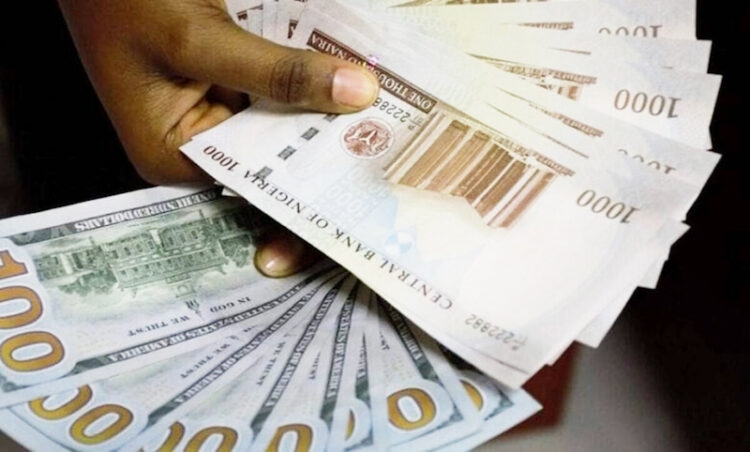The value of the naira dipped by 4.9 per cent last week closing at N1,627.40 to the dollar despite increased accretion of the country’s external reserves,
The external reserves increased by $347.53 million to $34.11billion as at March 7, 2024 from $33.016 billion it was on Jan 2, 2024.
Nigeria’s external reserves recorded 2.83 per cent year-to-date accretion following inflows from foreign capital and remittances.
The value of the naira at the Nigerian Autonomous Foreign Exchange Market (NAFEM) had dipped further, increasing the spread between it and the value of the Naira at the parallel market.
At the close of business on Friday, the Naira was selling at N1,600 to the dollar on the streets.
At the NAFEM, trades were consummated within the N1,400 and N1,652 to the dollar limit.
In the Forwards market, the Naira rates on the 1-month declined by 1.2 per cent to N1,600.35 to the dollar while the 3-month, 6-month and 1-year all declined by 2.5, 2.6 and 2.1 per cents to N1,664.04, N1,723.11 and N1,841.52 to the dollar respectively.
External reserves had seen a modest 3.64 per cent year to date accretion, standing at $34.11 billion as of March 7, 2024, as analysts described the rising reserves as an encouraging trend of improved foreign exchange inflow into Nigeria’s economy.
Analysts, whilst noting that the spread between the NAFEM and parallel rates had persisted for the second week within the N27.40 band, said they expect the naira to trade within a similar band across forex segments, supported by intensified regulatory spotlight.
Analysts at Cordros Research note that “notwithstanding the recent policy actions by the CBN, the currency has remained under pressure, given that the market supply remains frail. However, we are encouraged by the pace of market reforms and the apex bank’s renewed interventions.
“The CBN further reduced the forex backlog after providing a further $200 million during the prior week which reduces the backlog to circa $1.60 billion.
“In our view, as the CBN forges forward with its initiatives, which have included ensuring the naira assets are attractive to foreign participants (to drive capital importation), and domestic participants (to drive investments over speculation, and clears the forex backlog that dynamics in the forex market may improve and consequently lead to improved liquidity over the medium term.”
Cowry Assets analysts, in an emailed note, pointed out that Nigeria’s reserves, which has seen an uptick this year, had experienced a nearly two per cent dip since June 2023, following the foreign exchange unification exercise by the central bank.
“The decline in reserves since June 2023 can be attributed to various factors, including limited availability of foreign exchange liquidity due to low crude oil production, reduced export earnings, foreign exchange revaluation in 2023, and subsidy payments.
“Despite these challenges, the recent upward movement in reserves signals positive foreign exchange inflows into the economy. Notably, the CBN has reported a notable rise in total portfolio flows into the economy for 2024, currently standing at $2.4 billion compared to $3.9 billion in the entirety of 2023.
“Furthermore, within the first few days of March 2024, there has been a positive trend in total foreign exchange inflows driven by increased investor interest in short-term sovereign debt following adjustments to benchmark interest rates.
“Additionally, overseas remittances surged to $1.3 billion in February 2024, surpassing the previous month’s inflow of $300 million by more than four times. Foreign investors actively participated in the Nigerian market, purchasing over $1 billion worth of local assets in February.
“This surge in foreign exchange inflow was attributed to substantial growth in remittance payments from Nigerians abroad and heightened interest from foreign portfolio investors in acquiring naira assets.
“In our view, we see the positive rise in Nigeria’s foreign exchange reserves levels as encouraging, despite the continued weakening of the naira in various foreign exchange segments.
“The future trajectory of reserve accretion will be contingent on several factors, including the oscillation of global oil prices, Nigeria’s efforts to tackle oil theft, and the effectiveness of forex management policies by the central bank in the medium to long term. These factors will play a critical role in determining the sustained growth of Nigeria’s foreign reserves and overall economic stability.”
